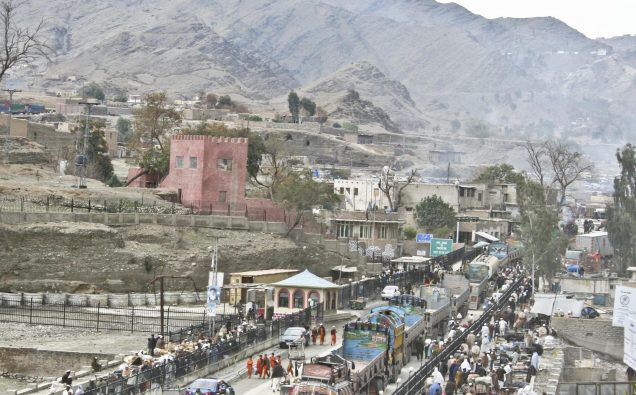
The view into Pakistan from the Afghanistan border at Torkham Gate Photo: Staff Sgt. Ryan Matson (U.S. Armed Forces)/Wikimedia Commons
After months of acrimonious statements and actions, Pakistan and Afghanistan are signaling agreement on enhanced cooperation to fight terror that has inflicted huge losses on both sides of a long porous border between them.
The United States has been reviewing its policy toward the region as it looks to establish stability in Afghanistan, which has been rattled by a number of threats including a raging Afghan Taliban insurgency, sectarian attacks, ISIS militancy.
Washington still has around 9000 troops in Afghanistan to assist the local security forces. However, the Afghan military and police have been having a hard time and Kabul has ceded control of around half of the territory to militant groups.
But meeting in Kabul, senior Pakistani and the Afghan officials also exchanged views on Chinese proposals toward mutual trust building in the wake of a spate of allegations and counter-allegations.
Foreign Affairs Secretary Tehmina Janjua and Afghan Deputy Foreign Minister Hekmat Khalil Karzai led talks while the Pakistani diplomat also had meetings with Afghan President Dr Ashraf Ghani, former president Hamid Karzai, National Security Adviser Haneef Atmar, NDS chief Masoom Stanikzai and Hizb-e-Wahdat leader Muhammad Mohaqiq.
“The two sides agreed that terrorism was a common challenge and there was a need to strengthen institutional cooperation between the two countries to effectively combat this menace,” a statement said.
The two sides agreed that lasting peace and stability in Afghanistan was critical for regional stability.
In her parleys, Pakistan’s foreign secretary emphasized that there was no military solution to the Afghan conflict and the focus should be on evolving a credible political settlement.
Recently Chinese Foreign Minister Wang Yi has recently shared some proposals on building trust between Pakistan and Afghanistan, reports said. A report in Pakistan Today says the two countries agreed to establish institutional cooperation and coordination during the Kabul meetings.
Both Islamabad and Kabul accuse each other of allowing militant groups to operate from their territories to fuel unrest in their countries. Afghanistan has long said the Afghan Taliban including the Haqqanis operate out of their havens on the Pakistani soil.
Pakistan has often accused that Kabul has done nothing to stop Pakistani Taliban from planning and carrying out attacks against Pakistan from the Afghan territory.
Islamabad shared its concerns with Afghanistan that the defunct Tehreek-e-Taliban and Jamat-ul-Ahrar (JuA) have sanctuaries and support from Afghanistan, a report in the newspaper said.
“Due to the shared concerns of cross-border terrorism, Pakistan has urged Afghan side to reinforce border management, intelligence cooperation and intelligence sharing. Since we have a long border with Afghanistan, divided families on both the sides of the borders who have ethnic and religious commonalities, there is a need to strengthen border management,” the official said, according to the newspaper.
Border management has long been a contentious issue between the two sides, and the United States has been brokering talks on expanding cooperation between two uneasy neighbors.

















